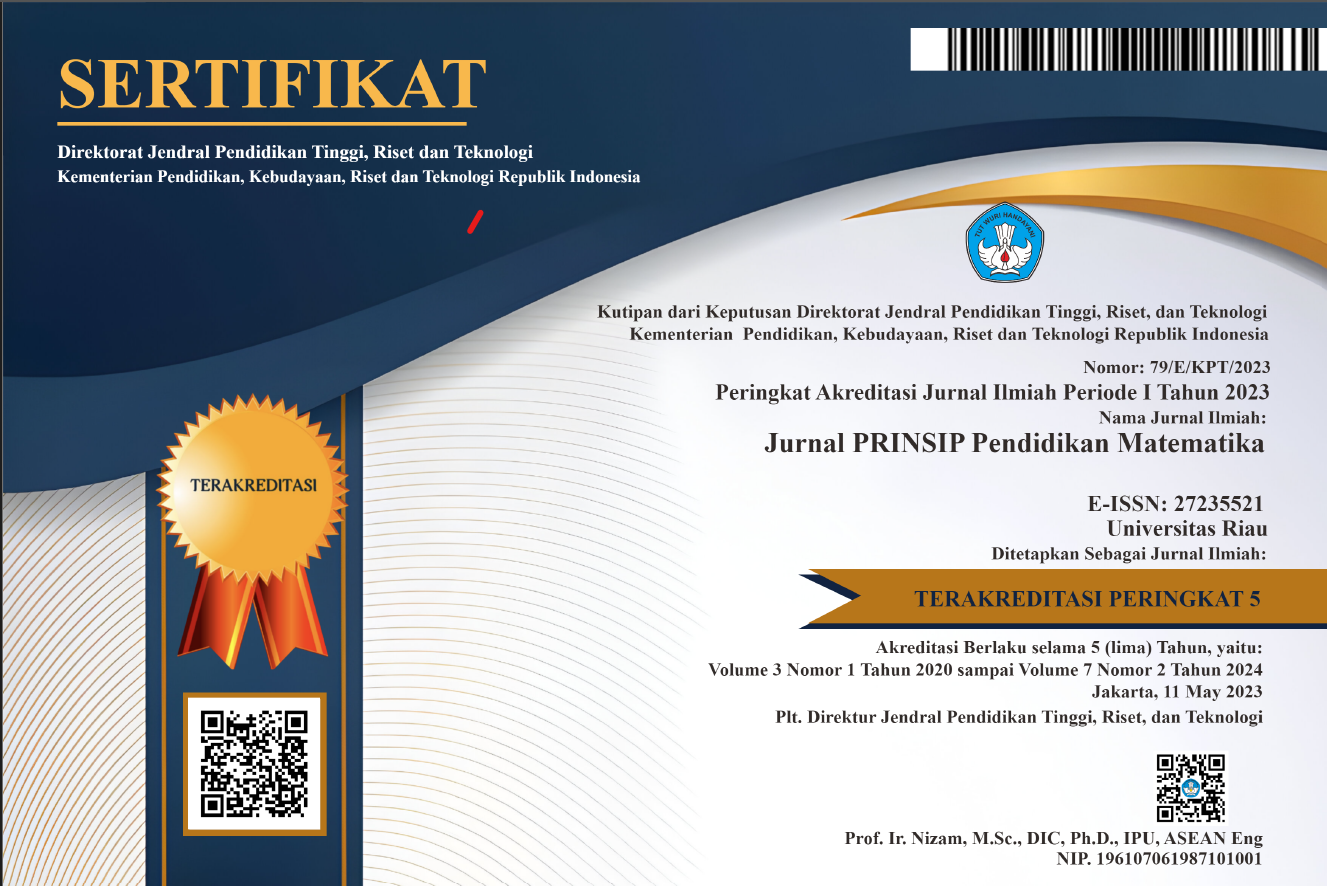IMPROVING MATHEMATICS LEARNING OUTCOMES ON SOLID GEOMETRY THROUGH THE USE OF ANDROID-BASED LEARNING MEDIA "GEOMETRY ADVENTURE"
Abstrak
The purpose of this study is to improve students’ learning outcomes through the use of the Android-based learning media "Geometry Adventure" in Mathematics instruction. This Classroom Action Research (CAR) was conducted over two cycles. The subjects of the study were 32 eighth-grade students at SMP Muhammadiyah 22 Setiabudi Pamulang. Data collection techniques employed in this study included learning outcome tests in the form of evaluation exercises and non-test methods such as researcher observations. The results indicate that the implementation of the Android-based learning media "Geometry Adventure" can enhance students’ mathematics learning outcomes. This is evidenced by the increase in the percentage of students actively participating in mathematics lessons using the "Geometry Adventure" media. The average learning outcomes percentage in cycle I was 19%, which increased significantly to 81% in cycle II. Based on the data analysis, it can be concluded that there was a significant improvement in students’ learning outcomes, accompanied by increased enthusiasm and greater active participation in the learning process compared to before the intervention. Furthermore, motivation and interest in learning also increased through the use of the Android-based learning media "Geometry Adventure”.
##plugins.generic.usageStats.downloads##
Referensi
Dilawati, O., Hadi, M. S., & Munir, I. S. (2024). The Use of Android-Based Learning Media to Improve Student Motivation in Grade VIII Pyramid Lessons. Jurnal Prinsip Pendidikan Matematika, 7(2), 118–128. https://doi.org/https://doi.org/10.33578/prinsip.v7i2.263
Kaafah, S. S., Hadi, M. S., & Munir, I. S. (2024). The Effectiveness of Mathematics Learning using Instructional Media for Eighth-Grade Students on Three-Dimensional Shapes. Jurnal Prinsip Pendidikan Matematika, 7(2), 88–97. https://doi.org/https://doi.org/10.33578/prinsip.v7i2.258
Mumtazah, B., Hadi, M. S., & Munir, I. S. (2024). Implementation Of Android–Based Learning Media to Enhance Mathematics Learning Motivation of Grade VIII Students on the Topic of Cubes. Jurnal Prinsip Pendidikan Matematika, 7(2), 150–159. https://doi.org/https://doi.org/10.33578/prinsip.v7i2.259
Nuraeni, R., Nurjanah, & Siregar, H. M. (2024). Eksplorasi Pembelajaran Kalkulus Integral dengan Menggunakan Teknologi. Plusminus: Jurnal Pendidikan Matematika, 4(1), 83–94. https://doi.org/https://doi.org/10.31980/plusminus.v4i1.1526
Siregar, H. M. (2022). Self-Regulation Differences of Mathematics Education Students Reviewing From Gender. Jurnal Mercumatika : Jurnal Penelitian Matematika Dan Pendidikan Matematika, 7(1), 8–18. https://doi.org/https://doi.org/10.26486/jm.v7i1.3010
Siregar, H. M., Nurjanah, & Nuraenia, R. (2024). Development and Integration of GeoGebra Applets in Mathematics Learning. Pedagonal : Jurnal Ilmiah Pendidikan, 8(1), 33–46. https://doi.org/https://doi.org/10.55215/pedagonal.v8i1.9362
Siregar, H. M., & Siregar, S. N. (2021). Profil Self Regulation Mahasiswa Pendidikan Matematika FKIP Universitas Riau di Masa Pandemi Covid-19. ANARGYA: Jurnal Ilmiah Pendidikan Matematika, 4(1), 1–10. https://doi.org/10.24176/anargya.v4i1.5601
Solfitri, T., Siregar, H. M., Kartini, & Permata, A. (2024). Facilitating Mathematical Creative Thinking Ability: Analysis of Validation, Practicality, and Effectiveness of Learning Modules. Jurnal Pendidikan Progresif, 14(1), 619–634. https://doi.org/http://dx.doi.org/10.23960/jpp.v14.i1.202445
Solfitri, T., Siregar, H. M., Maifa, T. S., & Putra, Y. (2024). Potentials and Challenges of Technology-Based Algebra Learning: A Classroom Experience Using Wizer.me. International Research Journal of Science, Technology, Education, and Management, 4(4), 86–98. https://doi.org/https://doi.org/10.5281/zenodo.14744684
##submission.copyrightStatement##
##submission.license.cc.by-nc-sa4.footer##




